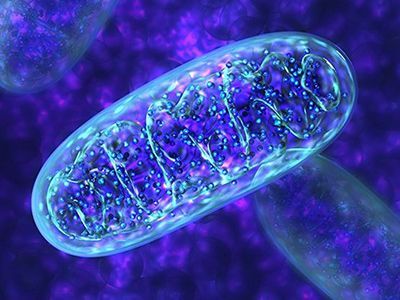Understanding the Mitochondria: How to Support Healing on a Cellular Level
authored by Taylor Appel, MSCN, RH (AHG)

Mitochondria are typically referred to as the “powerhouse” of our cells, and while this statement is absolutely true, well-functioning mitochondria can benefit more than just our energy supply.
What are Mitochondria?
Mitochondria are specialized cellular structures found in nearly every cell in our bodies (except red blood cells) and they support the production of one of our greatest energy sources, ATP or adenosine triphosphate. Additionally, these tiny battery-like structures help break down raw materials from our diet, such as nutrients, polyphenols, and other compounds, into a usable energy source that is essential for us to thrive. The health of mitochondria determines much more than energy production. It directly impacts both our overall health and longevity, and can be influenced both positively and negatively by our everyday behaviors, guiding our metabolic health, hormonal balance, and even directly altering gene expression.1,2
Signs and Symptoms of Mitochondrial Deficiencies
When cells are starved, overworked, or stressed in any capacity (from illness, toxic exposure, emotional distress, etc.) over a period of time, the mitochondria will be adversely affected. Mitochondrial dysfunction looks different for everybody and depends on many factors, such as physical and mental health. Other elements to consider that greatly impact mitochondrial health are the quality of our food, sleep, and external environment. Signs and symptoms of mitochondrial dysfunction may also be the result of previously diagnosed, or undiagnosed, physical or mental health concerns, and if you suffer regularly from these symptoms, seeking medical support is advised.

Signs & Symptoms of Lower-Functioning Mitochondria
- Brain fog/difficulty focusing
- Numbness/pins and needles in extremities
- Consistent constipation or diarrhea
- Difficulty regulating body temperature
- Frequent illness; viral and bacterial infections
- Chronic fatigue
- Sensitivity to bright light
- Intolerance to exercise
- Difficulty hearing
- Dysautonomia (autonomic nervous system dysfunction)
How to Support Your Mitochondria
The number of mitochondria found in each organism varies depending on how complex that organism is and its specific needs. Humans, for example, are clearly more complex organisms that require an orchestra, or thousands, of perfectly tuned musicians, or mitochondria, in order to run harmoniously. This can be near impossible to achieve, especially in our modern, fast paced, stress-filled world. So how do we positively impact mitochondrial health, giving us the best chance for a healthier, longer life?
Research has illuminated several ways to rejuvenate our mitochondria, supporting their energy production, and potentially optimizing both our health and life span. Both dietary and lifestyle modifications seem to play an impactful role in our mitochondria health, highlighting the importance of our daily choices, as well as tending to our emotional well-being and optimizing our resilience to stress.1,3
What we Eat Matters… on a Cellular Level
Let’s start with our diet. As mentioned previously, the mitochondria are like small batteries that need specific types of fuel to run optimally. Macronutrients, which includes fats, carbohydrates, and proteins, with the addition of the oxygen we breathe, are used by the mitochondria to create ATP via the Kreb cycle. This continuous cycle of energy production is happening thousands of times, simultaneously, inside the mitochondria of our cells, and this ongoing process requires a lot of energy input in order to happen effectively.
Research shows there are several nutrient and non-nutrient compounds that directly impact mitochondria health for the better. These compounds have been highlighted for their incredible mitochondria-boosting benefits when applied in the appropriate doses (bioavailability must be considered), circumstances (if there is the presence of disease, other relevant phenotypes, etc.), and populations (demographics of the individual).

Compounds & Food that Support Mitochondrial Health
- Omega-3 Fatty Acids: This healthy fat is responsible for most of the structural integrity of the mitochondria and helps reduce any stress that is impacting the cells. Omega-3 rich food sources include fatty fish like salmon, sardines, and other seafood like oysters, as well as flaxseeds, walnuts, and chia seeds.2
- Magnesium: Magnesium supports a healthy stress response in the cell, helps regulate the uptake of various minerals, and acts as a cofactor in ATP energy production. Magnesium rich food sources include pumpkin seeds, dark leafy greens, and quality dark chocolates.5
- Quercetin: This potent antioxidant helps to modulate and boost ATP production, increasing overall energy potential, and helps restore mitochondrial function when damaged. Quercetin rich food sources include capers, elderberries, hawthorn berries, and onions.4,6
- EGCG (Epigallocatechin Gallate): EBCG is another antioxidant-rich compound that helps optimize ATP production and support mitochondrial stress, especially in the cells of the brain, liver, and muscle tissues. ECGC can be found most abundantly in green tea.
- Resveratrol: Known as the anti-aging powerhouse, this compound also helps to protect the mitochondria by improving the body’s antioxidant status. It does this by helping to repair or remove dysfunctional mitochondria from the cell, improving gene and enzymatic expression, and can help slow the aging process at a cellular level. Food sources rich in resveratrol include dark pigmented berries such as cherries, blueberries, and the skin of red grapes (not to be confused with red wine, as alcohol is highly inflammatory and contraindicated for supporting optimal mitochondrial health).7,8
Making the conscious effort to include foods and botanical sources of these supportive compounds can help you optimize mitochondrial health, positively impacting your overall health and potentially even slowing the aging process!

Supplements the Promote Mitochondrial Health
In addition to the compounds mentioned above, many botanicals in particular contain various substances highly beneficial to our mitochondrial health and overall function, as exemplified by the potent benefit of EGCG from green tea. When used properly in supplemental form, botanical medicines can provide a more bioavailable resource for our mitochondria to efficiently utilize than their synthetic counterparts. Therefore, whole-food and botanical sources of any mitochondrial support is preferred.4,7 Here are a few of my favorites:
- CV-Res-Q: Formulated by Mederi Center Founder Donnie Yance and made by Natura Health Products, CV-Res-Q is a great example of the variety of benefits found in whole-food and botanical derived ingredients. The ingredients in this formula are chosen for their quality, therapeutic effectiveness, and ability to support mitochondrial health and overall well-being.
- N-Acetyl Cysteine (NAC)
- PQQ (Pyrroloquinoline quinone)
- Creatine
- CoQ10
- Acetyl L-Carnitine
Work with your healthcare provider to determine which of the supplements above may be most supportive for your personal health goals or specific concerns.4 The addition of one or more of these compounds could improve your health today, as well as support a healthy aging process.

Change your Habits… Improve your Mitochondria!
Subsequent to dietary changes, many lifestyle modifications have been identified to support mitochondrial health. For example, sleep hygiene and sleep efficacy (the amount of time spent asleep vs. time in bed), physical activity (or inactivity), stress resilience, and even toxic environmental exposures (fragrances, glyphosate, mold, etc.) can all profoundly impact mitochondrial health for better or for worse. Focus on the things you can easily change, including:
- Be mindful of the quality of your drinking water
- Pay attention to where and how your food was grown (choose local and organic when possible)
- Use cleaning and personal care products that don’t have synthetic fragrances, BPA, and phthalates, to name a few
- Make sure you have clean air to breathe (especially while sleeping, i.e, open your windows at night or get an air filter)
- Practice stress reduction techniques and regular mindful practices such as mediation, movement, singing, crafting
- Take adaptogenic herbs9,10
Although our everyday choices do have an overall impact on mitochondrial health, it is important to take it one step at a time, integrating each of these suggestions in a sustainable way. Only then will we see the actionable results we desire – improved mitochondrial function and more importantly, a greater sense of vitality while aging gracefully.
Join the Mederi Center community by signing up for our email list! We send several emails a month with product promotions for patients, practical tips for healthy living, blogs written by our practitioners, information about events, and other news. You can unsubscribe at any time.
References
- Osellame LD, Blacker TS, Duchen MR. Cellular and molecular mechanisms of mitochondrial function. Best Pract Res Clin Endocrinol Metab. 2012;26(6):711-723. doi:10.1016/j.beem.2012.05.003
- Advances in Nutrition, Volume 9, Issue 3, May 2018, Pages 247–262, https://doi.org/10.1093/advances/nmy007
- Jesus R. Huertas, Rafael A. Casuso, Pablo Hernansanz Agustín, Sara Cogliati, "Stay Fit, Stay Young: Mitochondria in Movement: The Role of Exercise in the New Mitochondrial Paradigm", Oxidative Medicine and Cellular Longevity, vol. 2019, Article ID 7058350, 18 pages, 2019. https://doi.org/10.1155/2019/7058350
- Khan NA, Govindaraj P, Meena AK, Thangaraj K. Mitochondrial disorders: challenges in diagnosis & treatment. Indian J Med Res. 2015;141(1):13-26. doi:10.4103/0971-5916.154489
- Pilchova I, Klacanova K, Tatarkova Z, Kaplan P, Racay P. The Involvement of Mg2+ in Regulation of Cellular and Mitochondrial Functions. Oxid Med Cell Longev. 2017;2017:6797460. doi:10.1155/2017/6797460
- Salehi B, Machin L, Monzote L, et al. Therapeutic Potential of Quercetin: New Insights and Perspectives for Human Health. ACS Omega. 2020;5(20):11849-11872. Published 2020 May 14. doi:10.1021/acsomega.0c01818
- Ungvari Z, Sonntag WE, de Cabo R, Baur JA, Csiszar A. Mitochondrial protection by resveratrol. Exerc Sport Sci Rev. 2011;39(3):128-132. doi:10.1097/JES.0b013e3182141f80
- Manzo-Avalos S, Saavedra-Molina A. Cellular and mitochondrial effects of alcohol consumption. Int J Environ Res Public Health. 2010;7(12):4281-4304. doi:10.3390/ijerph7124281
- Picard M, McEwen BS. Psychological Stress and Mitochondria: A Systematic Review. Psychosom Med. 2018;80(2):141-153. doi:10.1097/PSY.0000000000000545
- Lacedonia, D., Carpagnano, G.E., Crisetti, E. et al. Mitochondrial DNA alteration in obstructive sleep apnea. Respir Res 16, 47 (2015). https://doi.org/10.1186/s12931-015-0205-


